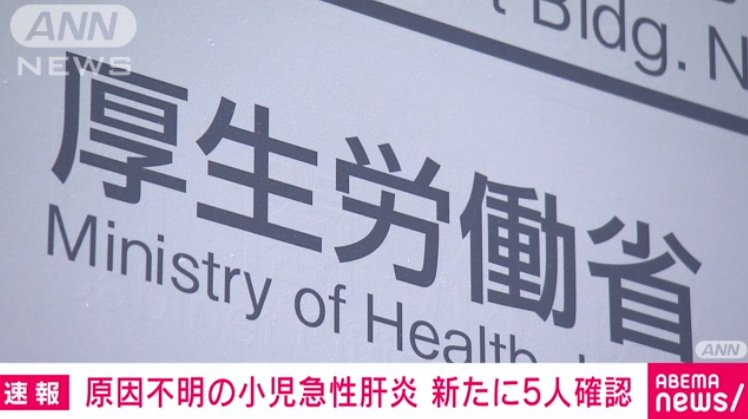
A total of 12 suspected cases of acute hepatitis in children of unknown etiology have been reported in Japan (screenshot of Japanese TV report)
Overseas Network, May 16thComprehensive reports from Japan’s Fuji TV and “ReseMom” website on the 16th, the Japanese Ministry of Health, Labour and Welfare recently conducted a domestic investigation on cases of acute hepatitis of unknown etiology reported in many European and American countries. It is said that as of May 12, a total of 12 suspected cases have been reported in Japan, and there is currently no clear treatment method in Japan.
On April 20, local time, the Japanese Ministry of Health, Labour and Welfare requested the local government to provide information on cases of acute hepatitis in children of unknown etiology, and on April 27, an active epidemiological investigation was conducted. The investigation results show that from October 1, 2021 to 10:00 on May 12, 2022 local time, a total of 12 suspected cases were reported, and no confirmed cases were found, including 1 adenovirus type 1 positive case.
According to the investigation, among the 12 suspected cases reported, there was 1 case of hepatitis caused by adenovirus type 1, while the etiology of the cases reported in Europe and the United States was mostly adenovirus type 41, and its correlation is still unclear. Not sure. In addition, the Japanese government is retrospectively investigating whether all the cases appeared after April 2022, and said that those who have been discharged must be observed.
The Japanese media pointed out that acute hepatitis is usually considered to have symptoms such as loss of appetite, general malaise, nausea and vomiting, but due to different causative viruses, the symptoms vary, and in some cases, liver transplantation is required. Adenovirus hepatitis is a relatively rare disease of adenovirus infection, usually occurs in immunocompromised patients, and may develop into severe disease. Currently, there is no treatment for adenovirus hepatitis in Japan. (Overseas Network/Wang Shanning Intern Compilation/Fan Xin)
Copyright works of Overseas Network, please do not reprint without authorization.